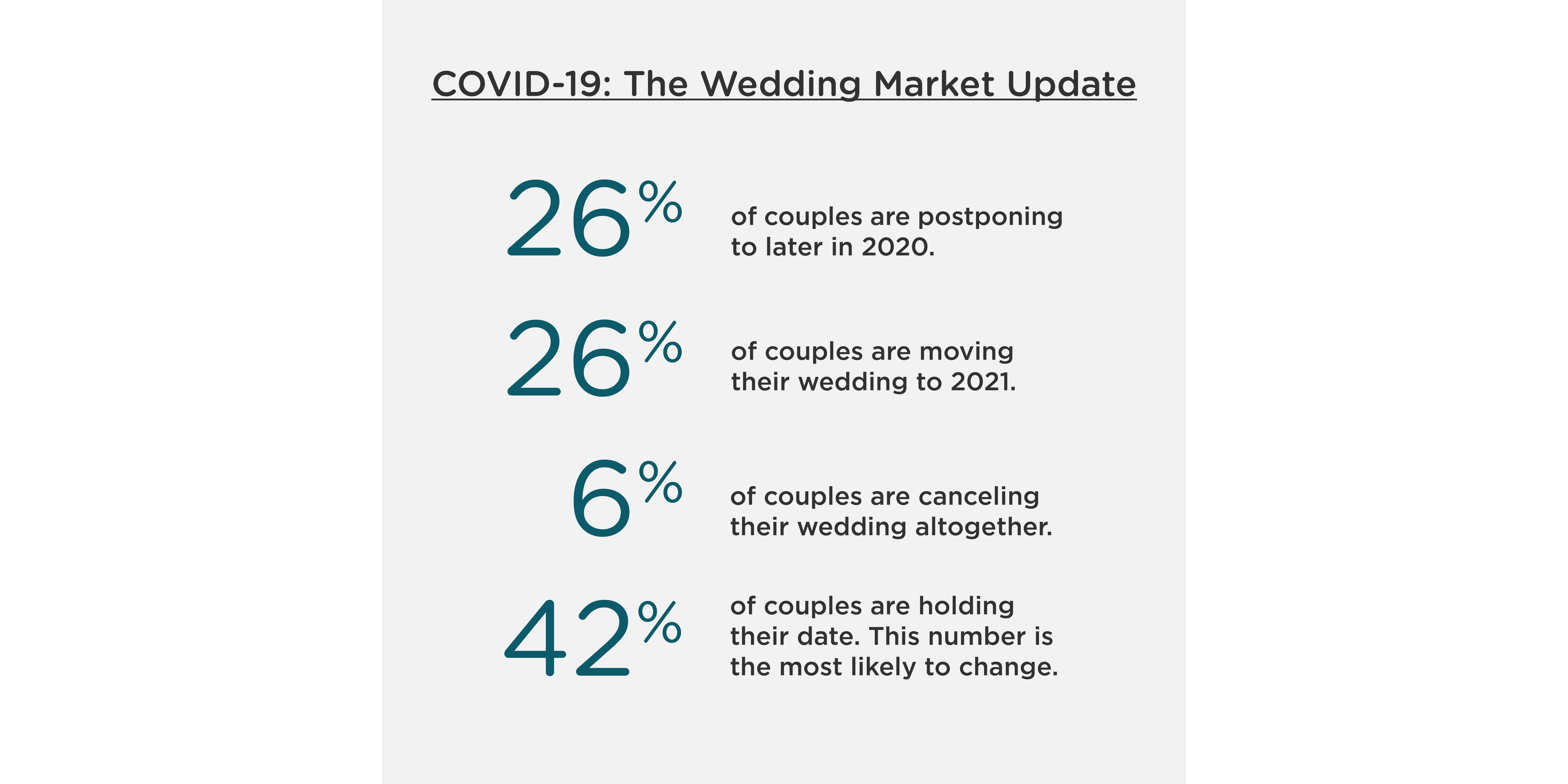COVID-19: Cancelations, Postponements, and Your Legal Rights
COVID-19 has turned the photography industry on its head. In particular, the wedding industry seems to be in total disarray. These are unprecedented times, and we're all figuring out the best course of action as we go.
We sat down with attorney Paige Hulse, photographer KT Merry, and event planner Annie Lee to get their perspectives on the state of the industry, and how to handle these uncertain months. Cancelations, postponements, and rebookings are inundating photographers — how do we manage these? What are our legal rights with Coronavirus? How do we weather this storm? How do we retain our clients through this uncertainty? Does force majeure apply to Coronavirus affected events? And how are other photographers handling similar circumstances?

We put your questions to our panel, seeking answers around managing clients and bookings right now. You can read our summary below, or watch the full live video here.
The state of the wedding industry
What's clear is that the wedding industry is changing rapidly. We don't know when this will end, and we still haven't come to grips with how much this will affect our businesses — that uncertainty is making photographers incredibly nervous.
Across the board, we're seeing most clients choosing to postpone, rather than cancel their weddings. There is some uncertainty among clients about whether they will be able to have their wedding, but much of that uncertainty seems to be coming from the industry itself. Vendors are nervous about their businesses, and that's making clients nervous. They're starting to worry about vendors going bankrupt and losing the money that they've already paid.

Data sourced from The Wedding Report
The critical thing to remember is that most clients are choosing to postpone their weddings, rather than cancel. Only 6% of clients are canceling their weddings. Once clients have decided to postpone, they make peace with that — they're looking ahead, and continuing to plan. Weddings are a huge financial and emotional investment for clients; they're not just going to disappear on you.
Communicating with your clients in times of stress
Never before has it been more important to show your clients kindness, humanity, and compassion.
Uncertainty is making everyone a little emotional right now. We're stressed because our businesses and livelihoods are at stake. Our clients are worried because their special day is in jeopardy. We need to remember that a wedding is already an incredibly emotional event — Coronavirus has added to that emotion, stress, and worry.
"If you're replying to a client inquiry about postponing or canceling with, "I'm going to consult my attorney," I can tell you that you are making a mistake." — Paige Hulse
We're facing questions and requests that we've never encountered before, and it's not always obvious what the answer is. It's crucial to avoid responding from a place of anger, hurt, or frustration. That's only going to escalate the problem.
Take a moment, take a breath, consider the request from all angles, try to find a solution that helps both you and your clients. Then go to great lengths to explain, in the most transparent way possible, why you are doing things a specific way.
"Every single client interaction that you have, whether or not they're your best friend, or just somebody that just randomly booked you, every single conversation, every single interaction is a negotiation. That does not mean that it's a conflict. It does not mean that it's a battle. That just means that you're working with them to navigate a tricky situation." — Paige Hulse

Retaining your bookings
The fact that most couples are choosing to postpone, rather than cancel, is promising. But we need to do everything in our power to retain as many bookings as possible.
The more clients that walk away from their non-refundable deposit, leaving you with a calendar of empty weekends, the harder it's going to be to continue to operate in the long run. You will most likely need to introduce a level of flexibility into the way you do business, working in ways that you never have before. Offer your clients the opportunity to move their booking without your usual fees, or think outside the box to enable clients to use their booking for something else.
"We have to incentivize our clients to want to work with us. To reschedule. To rebook. Postponing and rescheduling is much much better for the industry than just flat out canceling." — Paige Hulse
The bookings you retain right now will provide you with your income when this is all over, and life starts to return to normal.
Providing options to clients who have to postpone
With the 2020 wedding season getting shorter and shorter, and 2021 filling up fast, many of us are dealing with a rescheduling nightmare.
Treat each client on a case by case basis, and consider every angle before offering them a range of options. It can also be helpful to run several ideas past a good friend or a colleague, rather than defaulting to a quickfire response.
"Don't rush to the keyboard when you see a situation arise. Really sit and give it some thought. And think about possible solutions before responding." — KT Merry
When you put your mind to it, there will be many options available for you and your client. The final solution will depend on what the non-negotiable factors are for each party. A client who only wants you as their photographer will require a different solution to a client who is determined to get married on a specific date. It's all about being flexible and considering things from all angles.
Where there's a will, there's a way. You could offer your clients a midweek date at a discounted rate. You could allow them to transfer any payments already made to a different session, or even allow them to pass on the shoot to another person entirely. Or you could suggest some peers who would be able to shoot their wedding for them, while you look after the editing and album creation. Whatever options you put forward, you need to ensure that if you are going to charge the full price, that your clients do not feel like they are getting a downgrade.
If, after you've presented your clients with a range of options, no one can agree, then it's time to start negotiating your termination terms.
"Clients cannot legally force you to shoot on a new date that you are unavailable for. You won't be in breach of contract if they've rebooked for a date that you're not available." — Paige Hulse

Contracts for postponing and rescheduling
If this crisis has highlighted anything, it's the need for us to have sound contracts and business processes. As we reschedule bookings, we must simultaneously back ourselves up with contracts that protect ourselves and our clients. Every client agreement will need updating to cover new dates, new payment terms, and any changes to the contract because of Coronavirus.
One way to do this is to add addendums to your current contracts, but Paige advises that this could get you into some legal hot water if done improperly: "I'm advising all of my clients to have their clients sign a 'rescheduling agreement.'"
"We don't know what is going to happen; we don't want to be in a position where we keep adding addendum to addendum to addendum to contracts if a couple has to reschedule two or three times. This can quickly create muddy waters in terms of contract modifications and amendments. A lot of people can do that improperly and wind up in a breach of contract scenario." — Paige Hulse
Most of us will have language in our existing contracts stating that all payments are non-refundable and non-transferrable. But, in the current circumstances, many photographers are going out on a limb, allowing clients to transfer their deposits or payments to another service or date. This would put you in breach of your own contract.
A rescheduling agreement should cover how every dime (either paid or unpaid) is going to be handled, your payment provisions, and it should include language that outlines if there are additional costs for the new dates. Your rescheduling agreement also needs to include some mutual release language — this means that you are releasing each other from that original agreement. The release language is the part that's going to protect you from being in breach of your own contract.
Within your rescheduling agreement, you'll want to create a section called 'conditions precedent.' This section outlines what you and your client are agreeing to as you enter into your rescheduling agreement. The 'conditions precedent' should describe the costs involved for rescheduling (if any) and what you and the client have decided in regards to how any payments already made will be handled.
Creating a rescheduling agreement also allows you to include language about what will happen if a pandemic (Coronavirus) causes further cancelations or postponements to occur. If you do include updated language, the best business practice is to inform your clients of these changes — point it out to them directly and explain how it protects both parties.
Paige has a legally sound Rescheduling Agreement available on The Creative Law Shop, that is available to purchase.

Force majeure — does it apply?
Force majeure is French for superior force. It's a provision many photographers have in their contract to protect them should an extreme situation arise, which means they are unable to provide their services.
For force majeure to apply, the event or scenario needs to be so extraordinary, or completely unexpected that it is physically impossible to show up and provide the service. It's a provision for sudden and extreme scenarios.
"I have not yet seen — and I have looked at literally hundreds of contracts in the last couple of weeks — a force majeure provision that would apply for the Coronavirus." — Paige Hulse
For a force majeure provision to apply, the scenario or event that causes the non-performance needs to be unforeseeable and with no possible way to mitigate the effects. The very fact that we are discussing the possible cancellation and postponement of weddings due to Coronavirus is evidence that the situation is foreseeable. The fact that we are talking about the best ways to reschedule those weddings is further proof that it is possible to mitigate our non-performance.
Dealing with clients who are determined to have their wedding — even if you feel unsafe, or it is against the law.
The most important thing to remember in this instance is that whatever country or state you live in, the law will always supersede any agreement made with your client. I.e., an executive order that stipulates that gatherings over a specific size cannot take place will override your contract. Your clients cannot hold you to photographing any wedding that would be in breach of the law.
Many photographers won't have language in their contracts that allows them to walk away from a shoot if they feel that the situation is unsafe, and this is something that we should all include going forwards. If you do have language that covers unsafe working environments, then you do not need to provide your services.
Paige has language that covers safety and your working environment on The Creative Law Shop, which you can access by signing up for her regular newsletter here.
If you find yourself in a position where your contract does not protect you, and you do not want to provide your services because of the risk, then you need to start the negotiation process of terminating your contract. You will need to have them sign a termination agreement and begin the process of discussing how any payments already made are to be handled.
"Every single client interaction that we have right now is a negotiation." — Paige Hulse
Naturally, you'll want to avoid terminating agreements because that means less income in the long run. You may need to start putting a little bit of pressure on your clients, laying out the effect that proceeding will have on their wedding.
Try to emphasize just how many different executive orders and rules have come into place recently, outlining the various limits and restrictions on gatherings. You can reiterate the fact that no one knows what will happen, what additional restrictions may crop up, or if the event will even legally be able to go ahead at all.
Another way to convince your clients to consider moving their wedding day is to talk to them about their liability. Paige argues that if your clients were to end up in litigation because someone at your wedding got infected, the first question that she would be asking is, "Did you ever consider postponing due to fears of Coronavirus? If yes, then why did you continue on when the CDC and The World Health Organization put out guidelines telling you not to? What information did you have that ran counter to that?"
"You need to try to get the point across to your clients that this might not be the smartest and wisest way for them to celebrate their wedding." — Paige Hulse

Liability waivers
If you are willing to go ahead and photograph a small wedding, you must have your clients sign a liability waiver. Your waiver should state that your clients assume all of the risk for every person at the wedding.
Cancelations
If worst comes to worst, and your clients need to cancel their wedding, legally speaking, you should not be required to refund their deposit. However, this is going to be largely dependent on the strength of the non-refundable language in your contract.
Despite that, no matter what your legal rights are, you'll probably find yourself in a position where you'll need to negotiate with your clients.
Many clients are reacting emotionally right now, and we hear a lot of statements like, "a contract is a contract, but these are extraordinary circumstances, so why on earth are you trying to hold me to it."
Right now, transparency is crucial. You need to sit down and have an honest conversation with your client, educating them on your expenses — help them understand why you need to keep their deposit.
Come up with a cost breakdown for the money you've put into each wedding so far. You don't necessarily have to share this number with your clients, but have it at the ready so that when you enter into negotiations, you know why you are trying to stick to a specific number.

What you legally can do, and what you should do might be different.
Legally, if your contract language is strong, you can keep your full retainer, and that's that. But these are unprecedented times, emotional times, and allowing a bit of flexibility within your contract will probably help you in the long run.
Make every effort to help your clients move their date, or find another alternative. Treat your clients the way you'd want to be treated in these uncertain times: treat them with kindness. When this ends, it is those clients who will be singing your praises. On the other hand, sticking to the letter of your contract — probably written before Coronavirus even existed — will ruin relationships, causing issues later on. The decisions you make today aren't just about your income today, this week, or even this month. They'll impact your revenue and bookings for months, or years.
"It's not just about today's dollar." — Daniel Usenko
Now is the time to be an advocate for your business. Know where you stand legally, know what rights you have, then figure out what steps you should take. "Could" and "should" are sometimes two different things, and in these extreme circumstances, you need to be willing to negotiate.
"You may be legally correct, but you'll be in the winner's circle all by yourself. Because that's not the right way to win." — Annie Lee
You may need to bend and negotiate a bit so that you wind up with a good overall scenario. Sticking to the letter of your contract, and being unwilling to help your clients out in any way will result in a whole lot of unhappy people — that's not a winning scenario.
"Go back to the drawing board, know exactly where you stand, know what you need to fix moving forward, and then be an advocate for your business." — Paige Hulse
_____
There's no doubt that Coronavirus is throwing us curveball after curveball — it's not easy knowing how to navigate each issue, and there's no pre-existing template or example to copy.
What's most important right now is to humanize every interaction you have. Everyone is running on stress and emotion. If each interaction comes from a place of understanding and compassion, you'll emerge from this with a full calendar and a list of happy clients.
If you missed our live Facebook event, you can watch the full video here.
_____
Paige Hulse — Legal disclaimer:
This information is solely intended for educational purposes, and for general information purposes only. Nothing in this discussion should be taken as legal advice for any individual case or situation. This information is not intended to create, and receipt or viewing does not constitute, in no way establishes an attorney-client relationship. An attorney-client relationship is only formed when you have hired me individually and signed an engagement agreement. No past results serve in any way as a guarantee of future results.


